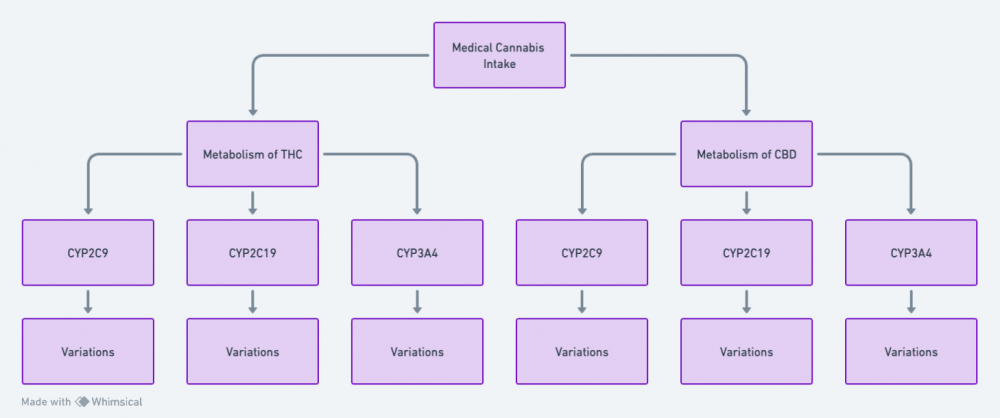
Genetic and Metabolic Factors Influencing Cannabis Response
The way individuals metabolize and respond to cannabis is influenced by a variety of factors, including genetics, environment, and the quality of the cannabis product itself. Enzymes like CYP2C19, CYP2C9, and CYP3A4 play a pivotal role in the metabolism of THC and CBD, and genetic variations in these enzymes can lead to varied consumer experiences. Understanding the complex interplay of these variables is crucial for personalized cannabis therapy.
Hepatic Enzymes and Metabolism
The main hepatic enzymes involved in the metabolism of cannabinoids are CYP2C19, CYP2C9, and CYP3A4. Genetic polymorphisms in these enzymes can lead to slow or rapid metabolism of cannabinoids, thus affecting their efficacy and safety profiles (1).
- CYP2C19: Variations can lead to either rapid or sluggish metabolism, affecting the duration and intensity of CBD and THC effects (2).
- CYP2C9: Particularly crucial for the metabolism of THC, variations in this enzyme can result in either an overly intense or muted psychoactive experience (3).
- CYP3A4: Responsible for metabolizing both CBD and THC, this enzyme can also be inhibited or induced by other drugs, leading to drug interactions (4).
Other Genetic Factors
Other genetic variables, such as endocannabinoid receptor polymorphisms and even hormone levels like cortisol, may also affect a person’s experience with cannabinoid therapies (5).
Environmental Impacts
Environmental factors like diet, concurrent drug use, and overall health status can also influence enzyme activity and cannabinoid metabolism (6).
Risks and Long-term vs. Short-term Consumption
Individuals with certain genetic profiles may experience increased risks of adverse effects, including anxiety, paranoia, or even liver toxicity in extreme cases (7). Over the long term, these risks may lead to more chronic health issues or interactions with other medications (8).
Change Over Time
While some genetic factors are permanent, enzyme activity can be modulated by environmental factors, other medications, and even age.
Comparison Table: Challenges and Genetic Variations
| Genetic Challenge | Manifestation | Amenable to Treatment | References |
|---|---|---|---|
| Slow metabolism (CYP2C19) | Reduced effects, longer duration | Partially | (1),(2) |
| Rapid metabolism (CYP2C9) | Intense but brief psychoactive effects | Partially | (3) |
| Hormonal effects (Cortisol) | Increased anxiety, stress responses | Yes | (5) |
Cautionary Note
Individuals with certain medical conditions should exercise caution when using cannabinoid therapies. For specialized and thoughtful care in such cases, consult Dr. Caplan at CED Clinic.
References
- Zendulka et al., “Cannabinoids and Cytochrome P450 Interactions.” Curr Drug Metab, 2016.
- Stout and Cimino, “Exogenous cannabinoids as substrates, inhibitors, and inducers of human drug metabolizing enzymes: a systematic review.” Drug Metab Rev, 2014.
- Sachse-Seeboth et al., “Pharmacokinetics of delta9-tetrahydrocannabinol in patients undergoing CYP2C9 genotyping.” Eur J Clin Pharmacol, 2009.
- Yamaori et al., “Cannabidiol, a major phytocannabinoid, as a potent atypical inhibitor for CYP2D6.” Drug Metab Dispos, 2011.
- Lu and Anderson, “Cannabinoid Signaling in Health and Disease.” Can J Physiol Pharmacol, 2017.
- Huestis et al., “Human Cannabinoid Pharmacokinetics.” Chem Biodivers, 2007.
- Bergamaschi et al., “Safety and side effects of cannabidiol, a Cannabis sativa constituent.” Curr Drug Saf, 2011.
- Solowij et al., “Therapeutic Effects of Prolonged Cannabidiol Treatment on Psychological Symptoms and Cognitive Function in Regular Cannabis Users: A Pragmatic Open-Label Clinical Trial.” Cannabis Cannabinoid Res, 2018.
This information is intended for educational purposes and should not replace personalized medical advice. For specialized cannabis-related medical guidance, contact Dr. Caplan at CED Clinic.
📗 Note: This diagram is like the movie trailer. Ready for the blockbuster? Get your popcorn and “The Doctor-Approved Cannabis Handbook” here 📗.

Summary and Search Terms
Genetic Factors Influencing Cannabis Response: An In-depth Exploration
The interplay between genetic makeup and the response to cannabis is a burgeoning field of study, revealing how deeply our DNA can influence the outcomes of cannabis use, both therapeutically and recreationally. As we uncover the layers of genetics and cannabis sensitivity, it becomes increasingly apparent that our unique genetic profiles play a critical role in shaping our experiences with cannabis.
The exploration into how DNA affects THC and CBD effects has led to groundbreaking insights, particularly in understanding why individuals experience vastly different reactions to the same cannabis strains or products. This variability can be attributed, in part, to genetic predispositions to cannabis addiction, where certain genetic markers significantly increase the likelihood of developing dependency issues.
Variations in cannabinoid receptor genes further complicate the cannabis response landscape, suggesting that personalized cannabis medicine could soon become a reality. By identifying genetic markers for cannabis response, healthcare providers can tailor medical marijuana treatments to achieve optimal efficacy, minimizing adverse effects and improving patient outcomes.
Recent studies have begun to shed light on the genetic factors involved in cannabis metabolism, offering explanations for the diverse range of effects experienced by users. This research paves the way for genetic testing in cannabis treatment planning, heralding a new era of precision medicine where cannabis therapies are customized to an individual’s genetic profile.
The role of genetics in cannabis-induced side effects is a critical area of inquiry, as understanding these relationships can lead to safer, more effective cannabis use. The pharmacogenomics of cannabis is rapidly evolving, with significant implications for both therapeutic and recreational use.
As genetic research on cannabinoid receptors progresses, we are moving closer to a future where cannabis genetics play a central role in personalized therapy. This advancement holds the promise of optimizing cannabis therapy outcomes through detailed genetic profiling, ultimately personalizing cannabis dosage based on genetics to meet the unique needs of each individual.
This in-depth exploration into the genetic factors influencing cannabis response not only enriches our understanding of cannabis pharmacology but also opens up new pathways for personalized treatment strategies. As we continue to unravel the complex relationship between our genetics and cannabis, the potential for tailored therapies that cater to the individual genetic makeup of each person offers a promising frontier in both medical and recreational cannabis use.

